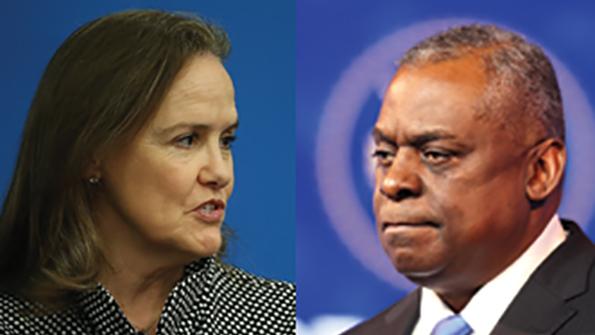
Ask the Editors: The Aviation Week Network invites our readers to submit questions to our editors and analysts. We’ll answer them, and if we can’t we’ll reach out to our wide network of experts for advice.
Why wasn’t Michele Flournoy chosen as the next U.S. Defense Secretary? She seemed like a lock for the job.
Jen DiMascio, Aviation Week’s Executive Editor for Defense and Space, answers:
This is a good question, given that the Senate is poised to consider the nomination of Army Gen. (ret.) Lloyd Austin, who left the military just four years ago.
Michele Flournoy had seemed primed for the role. She spent her career in and out of the Pentagon working on strategic thinking as well as addressing how the military could maintain its technological edge.
In her last position at the Pentagon, she served as undersecretary of defense for policy for the Obama administration. After leaving the Pentagon in 2012, dissatisfied with the way it did business, she joined the Boston Consulting Group to learn how she might help fix the system. Then, along with secretary of state nominee Antony Blinken, she created WestExec Advisors, a group that advises clients on how to handle geopolitical risks.
One year ago, while at WestExec, Flournoy provided clear-eyed testimony to Congress outlining how the Pentagon should respond to China. “The department needs to make urgent investments in its technological capacity and new operational concepts, redouble its commitment to allies and partners, and take consistent actions to protect and adapt the rules-based international order,” she said. “Speed is of the essence, and we are not moving fast enough, given how rapidly the challenges we face are evolving.”
Some nongovernmental officials concerned with Russian and Chinese competition or the security situation in the Asia-Pacific region are disappointed that she didn’t get the nod.
President-elect Joe Biden’s selection of Austin has caused hand-wringing on Capitol Hill, primarily because his recent departure from service requires senators to waive a law that stipulates the defense secretary should spend at least seven years as a civilian before taking on that role.
At a Jan. 12 Senate Armed Services Committee hearing, Republicans and Democrats expressed concerns about the need to establish civilian control over the military. Many of them want stronger civilian control following the Trump administration, which secured a waiver for the then-recently retired Marine Gen. James Mattis to serve as defense secretary. President Donald Trump selected two former generals to lead the National Security Council and allowed a large percentage of civilian roles to remain vacant.
Lindsay Cohn, a U.S. Naval War College professor who testified before the committee, said the issue revolves around the difference in perspective: Members of the military are trained to use force, whereas civilians are trained to consider the military as part of a broader political negotiation.
Since Austin’s nomination creates that complication, why nominate him now?
Like Flournoy, Austin has a deep resume with 40 years of experience in multiple areas of the Pentagon. In addition to having led U.S. Central Command, he was the vice chief of staff of the Army, led the military campaign to defeat the Islamic State in Iraq and Syria, and oversaw the withdraw of troops from Iraq.
Sen. Mike Rounds (R-S.D.) offers that a recently retired officer might be a good choice because of the uniformed military’s popularity and distance from politics at a time when the national discourse is so bifurcated. “This is not going to be a politically charged nomination,” he said.
Sen. Richard Blumenthal (D-Conn.) said civilian control of the military will be particularly important because of the Jan. 6 siege of the U.S. Capitol, in which active duty, reserve and retired military officers took part alongside white supremacists. “These kinds of dangerous tendencies need to be effectively countered and disciplined and investigated by the next secretary of defense, as a civilian, taking control in a way that may create some adversarial relationships,” he said.
In his statement announcing Austin’s nomination and in a Dec. 8, 2020, essay in The Atlantic, Biden underscored that aspect of his historic choice as the nation’s first Black defense secretary. “Austin will bring to the job not only his personal experience but the stories of the countless young people he has mentored,” Biden wrote. “If confirmed, he will ensure that every member of the armed forces is treated with dignity and respect, including Black, Latino, Asian American, Native American, women and LGBTQ service members.”
A New York Times piece indicated that along with the draw of diversity, the personal connection between the president-elect and the general might have contributed to his nomination. The article points out that Biden’s son Beau sat next to Austin during church services in Iraq, and Biden and Austin spent hours discussing the withdrawal of troops from Iraq.
But that experience in Iraq may be what best prepares Austin to address the incoming president’s top priority: defeating COVID-19.
“The next secretary of defense will need to immediately quarterback an enormous logistics operation to help distribute COVID-19 vaccines widely and equitably,” Biden wrote in The Atlantic.
“Austin oversaw the largest logistical operation undertaken by the Army in six decades—the Iraq drawdown.”
Austin is scheduled to testify before the Senate Armed Services Committee on Jan. 19.






Comments
I have nothing against Mr. Austin and possibly as a person of color its a great military career and accomplishments.
DOD is not the military. We have the Joint Chiefs and we have the secretaries of Army, Navy/Marine and Air force for that specif skill set. DOD is foremost procurement and sustainable of forces.
DOD is a mess. The Navy has hosed up the Ford Class that is concurrent production all over again which is insane (no elevators planned right, no prototype test for the all new capture and launch system, the decks are not F-35 ready?). I would not give the Navy another dime until they fire the entire administration force. A two year old would have done better.
The USAF is equally a problem, the F-35 continues to be a train wreck (that is an insult to train wrecks acualy).
DOD is primary a weapons procurement force sustainment and all that entails .
Mr Austin has no background in the DOD field nor has he demonstrated he has an inherent capability.
While she may not have been the only good choice, Michele Flournoy was the type of background I would have been looking for in that position.
While I overall applaud Bidden, he blew it on this choice and we will soon see a reset and hopefully experienced DOD operative and reformer backs him up.
Smokerr - Thank you for Starting your comment with a straightforward unvarnished assessment of this generals performance that was the kind of analysis that we no longer get from either of the political parties of this country.